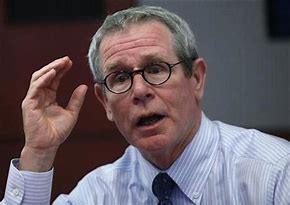In a Jan. 9, 2019 press release, the American Institute of CPAs (AICPA) lists ten steps individual investors should take to transform themselves into “a new financial you” in 2019. The CPAs offered the list honestly to help Americans “ensure their financial house is in good order and set themselves up to achieve their monetary goals.”
Like many others offered by banks, investment companies, financial planners, and fund companies, this year-end list stressed the need to manage taxes and risk, rebalance portfolios, make regular retirement contributions, learn new skills, and try to negotiate a better salary.
This is essential advice. Unfortunately, the tasks in these lists fall very short of helping Americans achieve their financial goals in 2019.
The reason is that teaching financial literacy alone, without presenting it inside today’s hyper-corporate political framework, is an incomplete, misleading, and, in many cases, dishonest effort.
Teaching the basics of stocks, bonds, diversification, risk, and tax management are critical financial lessons. The problem is that they are intentionally presented without addressing the much more significant issues of wage stagnation and corporate supremacy and how government policies, often based on neoliberal policies, favor corporations and the wealthy average citizens.
The introduction of financial literacy into pre- and post-retirement services is a function of the demise of pension plans. With the decline of defined benefit plans and the resulting fundamental change in employer-employee relationships, corporations shifted all financial risk to average workers. These people now make serious financial decisions that could impact their lives 20 or 30 years into the future. And they have to assume this substantial financial risk without limited knowledge or guidance.
After it became evident that average individuals were well ill-equipped to make long-term market and asset allocation decisions that have confounded many professional investors, corporations made a weak effort to educate employees about the basics of long-term retirement investing via financial literacy classes. 
But there was a problem: most financial literacy classes have been sanitized to avoid discussing the political role corporations and neoliberal policies play today. These policies are narrowing opportunities for achieving the long-term financial resources individuals need to achieve a financially secure retirement. This helps explain why half of Americans have zero net worth, yet we live in the richest nation in the world.
Omitting any discussion of neoliberalism is a critical and intentional omission by the corporate sponsors of financial literacy classes and the financial planners who teach them. Why are they not teaching why the people sitting before them may never be financially secure? What are they hiding, or is it something they don’t know?
Facing the Problem of Neoliberalism
To correct these narrow, slanted financial literacy presentations, we should discuss neoliberalism, how it works, what it stands for, and how it directly impacts the wealth-creation abilities of average workers. While neoliberalism is an intimidating political science term, it is easy to recognize.
Neoliberal economic policies stress the dominance of corporations over public entities, the deification of “market forces,” low taxes on corporations and the wealthiest citizens, and the importance of serving the needs of the individual instead of those of society.
Neoliberalism explains the Citizens United Supreme Court ruling that categorized corporations as individuals so they could control the political system while cutting the taxes that fund Social Security, Medicare, Medicaid, and other social welfare programs. It also explains the push for deregulation and the rise of self-centered Libertarianism.
Neoliberalism may be a nerdy, academic word, but it is the economic-financial flip side of neoconservatism. Neoconservatives believe in the free market, military intervention, and political individualism. Yet, while the political science terms turn off many people, the ill effects of these policies are evident in everyday society, both here and abroad, and affect billions of people.
In this context, average investors can better see how the wealthy (called capital in economic terms) benefit over average citizens (called labor) and how a political process favors one group (often corporations and the very rich) at the expense of others to produce intentional wealth disparities.
Under the existing financial literacy teaching curriculum, average investors are taught that their wealth creation abilities depend on their ability to understand the stock and bond markets and manage portfolios and expenses. However, as any investment professional knows, this is only a tiny part of any wealth creation process.
The key to wealth creation is wage growth (based on gains in productivity and human capital) accompanied by expense management. Conversely, the most significant detriment to wealth creation has been neoliberal policies, including wage stagnation, accompanied to a lesser degree by globalization, technology, and a global rise of a more competitive and cheaper workforce.
Why Is Political Economy A Pariah Topic?
Since political economy deals with wealth, power, labor, and capital, it is understandably a highly charged topic. Wealth, power, labor, and capital are not terms you’ll hear on CNBC, MSNBC, and FOX. Still, today, the political economy centers on the highly unequal distribution of wealth and power, topics that are not conducive to discussions in the corporate cafeteria or cubicle land.
This intentional avoidance happens because the vortex of the anti-retiree and anti-individual investor political philosophy is directly tied to neoliberalism.
Investors don’t have enough money in their retirement accounts after decades of work. This is essentially not due to poor budgeting or frivolous spending (although that is encouraged in a consumer society). They don’t have enough income after working years on the job.
As cited in the paper, The Neoliberal Political Economy and Erosion of Retirement Security, by Larry Polivka and Luo Baozhen (The Gerontologist. April 1, 2015; 55(2):190)
“Neoliberalism is fundamentally designed to reduce costs to the corporate sector, including reduction in labor costs (wages, pensions, and health care benefits) and to enhance profits. Neoliberal priorities also include low tax rates on income and wealth, which limits fiscal options for ensuring the solvency of the Social Security and Medicare programs, even as their importance grows. In short, understanding the challenges confronting our retirement security programs requires an analysis of the shift in the U.S. political economy towards neoliberalism and its differential impact on workers, retirees, investors, and corporate management.”
While a primary financial education is essential, it is deficient if not paired with an explanation of today’s political realities. Without this political education, those who teach financial literacy only address the symptoms of why their students or clients will not have upward economic mobility.
As it is today, those teaching financial literacy only address a small and politically safe part of the problem but not its cause. Just as no conscientious doctor would only treat a patient’s symptoms, those who teach financial literacy must treat the cause (neoliberalism), not the symptoms.
Yet even as corporations control the financial literacy curriculum, things may change. According to Doug Cliggott, lecturer at the

Political Economy Research Institute (PERI) at the University of Massachusetts, Amherst, “the political pendulum that started with the introduction of neoliberalism under Reagan now seems to be swinging in the other direction.”
Cliggott cited the enormous financial burdens of student debt and rising medical costs as volatile issues facing millions of Americans. “We may be approaching the tipping point because too many people are having a hard time financially since households are not getting sustained economic growth because people are not getting raises.
“For instance, a recent Federal Reserve study found that the student debt epidemic is hurting the housing market. So, as this economic reality becomes more vivid, institutions will not have any choice except to explain why all this is happening. And what we have today is a situation where the trickle-down neoliberal economic agenda does not explain how the world works,” he said.
Similarly, teaching long-term financial management in financial literacy classes is useless if a person has limited capital. It’s more honest to address the source of wealth deficiency, correct the problem, and then manage expenses and build capital. This should be the new goal of financial literacy programs. Anything less is an intentionally deceptive effort.











